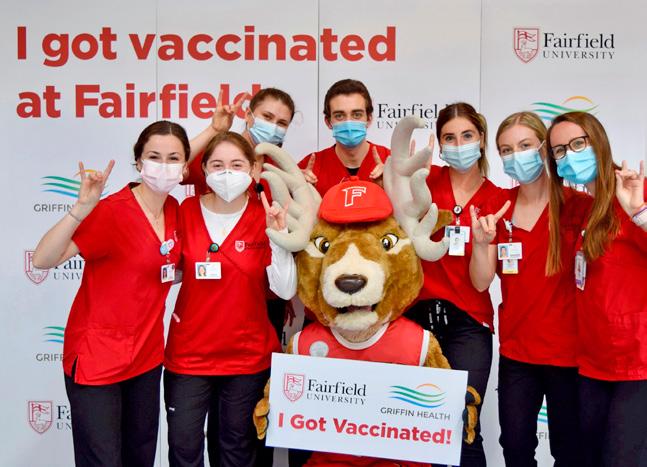
3 minute read
A Call for Public Health Professionals
As the coronavirus pandemic swept across the United States, one thing became clear — the need for public health professionals is more pressing than ever.
In May 2021, the Biden Administration announced a $7.4 billion plan to recruit and hire public health professionals to combat Covid-19 and prepare for future public health crises. The plan would allow states to expand their public health departments, expand the CDC’s Epidemic Intelligence Service, and establish a Public Health AmeriCorps.
As a leader in healthcare education, Fairfield Egan has been training public health professionals since the launch of a program under its Health Studies branch in 2018. Offered as both an undergraduate major and minor, a public health degree provides students with the opportunity to learn more about the health issues facing communities.
Rooted in science and social justice, public health is a prevention-oriented, multi-disciplinary field that promotes conditions to protect and improve the health of people and communities. Public health professionals are involved in a variety of roles including outbreak investigation, humanitarian response, cancer and heart disease prevention, injury and violence prevention, environmental toxicology, advocacy, immunization, bioterrorism surveillance, food and drug quality, public health nutrition, zoonotic disease control, corporate wellness, and more.
“The Egan School is ready to educate future public health professionals in both nursing (as public health nurses are needed) and public health. Our program is new and growing, but we have the capacity and resources to accept larger incoming classes and internal transfers from other majors each year. In addition, we are currently developing a master’s program to meet the need for graduate-level public health professionals,” said Program Director Kimberly N. Doughty, PhD, MPH, CHES.
Fairfield’s Public Health program’s coursework reflects the interdisciplinary nature of the field by having students take courses in biological sciences, environmental science, nursing, the humanities, social sciences, and administration.
This past year, Dr. Doughty and Jennifer Schindler-Ruwisch, DrPH advised 16 students’ capstone projects, covering a variety of relevant public health topics that included food insecurity, small business mask requirements during the pandemic, racial injustice and health disparities, and substance abuse. These same students doubled as interns on and off campus, working in vaccination clinics and other essential on-ground Covid-19 efforts to protect the well-being of others, reduce health disparities, and promote the core values of the program.
Students pursuing a public health degree partake in a Community Engaged Learning (CEL) course, in which they are appointed to work with community partner Caroline House of Bridgeport. This past semester, the students focused on maintaining physical and mental health during the pandemic, using virtual wellness workshops, creating videos, and leading cooking demonstrations and activities for families and young children.
“Training undergraduates in public health is critical in today’s world. The need for public health professionals at all levels — community, society, policy — continues to grow. Our program trains undergraduates to be an important part of this transformative work. This is what makes it so critical (and special!),” said Dr. Schindler-Ruwisch.
As part of the Public Health program curriculum, students are required to participate in an internship. This year, public health major Kristen Boyle ’21 partnered with Southwest Community Center to launch a three-episode advanced directives podcast. Each episode explored a guest’s experiences involving an advanced directive; topics included the factors that drive a patient to obtain an advanced directive, the importance of having one, and the resources available to patients. The podcast’s list of guests will feature a patient, an internal medicine physician, and the chief medical officer at Southwest.
The Egan School is in the process of developing a fully online master’s-level program in public health designed to prepare graduates for a wide range of careers. The proposed 42 credit curriculum is designed to meet the accreditation criteria established by CEPH.
Dr. Doughty said, “The Egan School’s commitment to interprofessional education makes it an ideal home for a graduate program in public health.” l E
Kimberly Doughty Jennifer Schindler-Ruwisch









